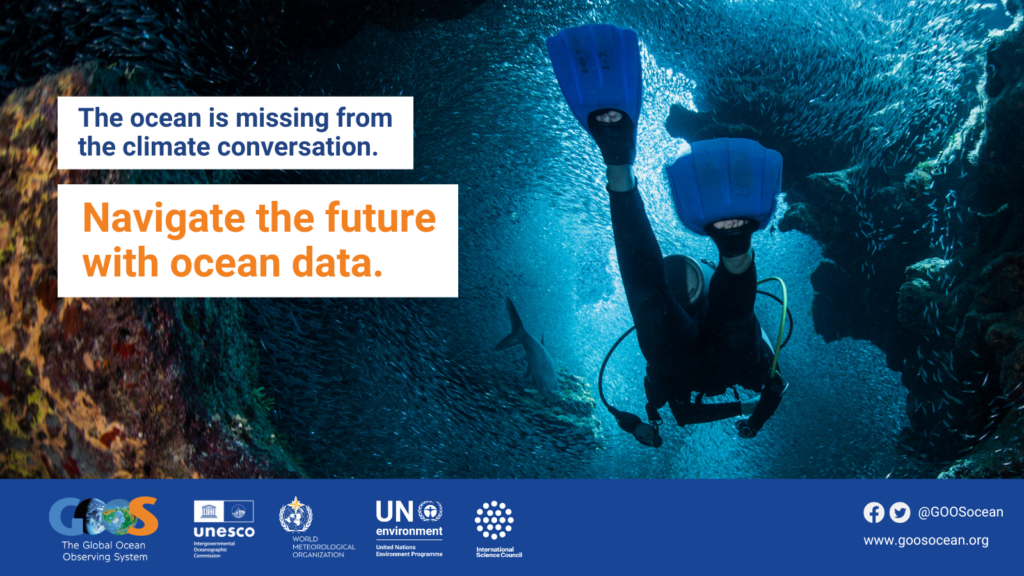From November 30 to December 12, 2023, nations will convene in Dubai for this year’s Conference of the Parties (COP28) on climate change – the most important annual gathering addressing climate action. GOOS is there to raise the profile of ocean observations in climate change mitigation and adaptation strategies.
Download our flyer for COP28 here, read our latest articles on ocean data and climate, and take a look at the list of side events on ocean observing in Dubai!

The expertise and framework to use ocean knowledge to tackle climate change are here. The time to act is now.
At COP28, GOOS highlights the crucial role ocean observations will play in measuring carbon and developing carbon dioxide removal strategies, early warnings for climate change related hazards, and community adaptation (Download GOOS COP28 flyer here).
Dive into our latest set of articles that explore these topics:
- COP28: We cannot chart climate progress without ocean data – by GOOS Director Joanna Post
- Ocean observing: a cornerstone for early warnings and coastal resilience – developed in collaboration with the World Meteorological Organization’s Early Warnings For All initiative and the GOOS CoastPredict programme
- Adapting to climate change: the role of ocean data, featuring the GOOS Ocean Observing Co-Design programme and Essential Ocean Variables
Side events on ocean observing at COP28:
2 December 2023
- Climate Change, Deoxygenation and Biodiversity in the High Seas and Deep Sea: Interactions and Policy Opportunities
09.30-11.00 (GST time) | Blue Zone | Ocean Pavilion
Life in the high seas and deep ocean plays critical but often ignored roles in Earth’s climate, such as carbon storage. The intensifying impacts of climate change, including ocean deoxygenation, as well as some ocean-based climate interventions are now threatening these crucial functions. In this panel, experts will examine oxygen as an indicator of climate change, proposed open ocean-based mitigation, and how biodiversity and climate policy can work together to maintain ocean climate services.
3 December 2023
- Earth Information Day
Blue Zone | Plenary 2
Earth Information Day 2023 will provide a dialogue for exchanging information on the state of the global climate system and developments in systematic observation. It will comprise a plenary session with an opening segment and three panel sections, as well as a World Café (WC) session. - Ocean Decade 2030: Science, Action and Partnerships for Climate Action through the Ocean Decade
9.30-12.00 (GST Time) | Blue Zone | Ocean Pavilion
The event will look across the entire ocean science value chain from observations to data, through to applications and services needed to solve the most pressing climate issues. It will address the enabling environment required to generate and apply robust ocean science and knowledge including issues such as capacity development, partnerships, resource mobilisation and diversity considerations.
4 December 2023
- Coordinating for greater ocean-based climate change ambition: A UN-Oceans perspective
11.30 -13.00 (GST Time) | Blue Zone | Side Event Room 7
UN-Oceans entities are coordinating for climate-smart, ecosystem focused and sustainable ocean management and planning. With the Global Stocktake GST and increased ambition in mind, this side event will showcase how UN-Oceans is building synergies at the national and international levels for ocean-based mitigation and adaptation. - Blue Carbon dialogue
15.00 -16.30 (GST Time) | Blue Zone | Ocean Decade x OceanX Pavilion
During COP 28 GO-BC (Global Ocean Decade Programme for Blue Carbon – GO-BC, led by Bill Austin from the St. Andrews, UK) together with us IOC, the IAEA, and the Foundation Prince Albert II (Monaco) hosts a Blue Carbon dialogue.
6 December 2023
- In support of OA Action: Leveraging UN Mechanisms for Local OA Adaptation and Resilience
16.00-17.30 (GST Time) | Blue Zone | Commonwealth Pavilion
The event will illuminate key information and science capacity gaps alongside the policy, management, and financing needed to respond to ocean acidification (OA) and it’s impacts. Panel one will discuss how UNFCCC and UN mechanisms may be better leveraged to provide direction and support the needs of governments. Panel two will showcase examples of OA Action taking, including through international, region and local collaborations to identify data and evidence needs for OA mitigation and adaptation.
